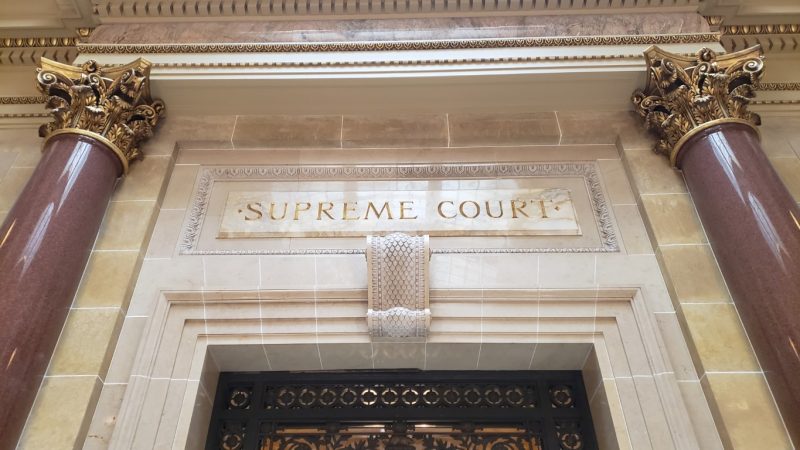The conservative Wisconsin Institute for Law & Liberty is asking the state Supreme Court to overturn four of Gov. Tony Evers’ partial vetoes in the budget, accusing him of using his veto pen to “turn lawmaking into a competing game of Scrabble.”
The suit, filed on behalf of three taxpayers, says the moves created policy without legislative approval. It alleged such use of the governor’s veto authority is “inconsistent with the exclusive vesting of legislative power in the Assembly and Senate.”
Speaking with reporters at an event in Watertown Wednesday, Evers responded to the WILL suit by saying that “it’s time for our state to move on.”
“We had an election, we had a budget, the budget was signed and deliberated by Republicans and Democrats, so I’m ready to move on,” he said. “Apparently they’re not, but the election did happen last November.”
The suit is challenging four of Evers’ partial vetoes issued earlier this month.
One transformed a grant program aimed at replacing school buses into $10 million for electric vehicle charging stations.
The second gave the Department of Transportation the authority to dole out $75 million in grants for transportation and transit projects, money GOP lawmakers had originally set aside for road work.
The third eliminated a budgetary proposal that would have created a $100 fee to register trucks, and the fourth expanded the definition of taxable vaping products.
In a Capitol press conference Wednesday, WILL President and General Counsel Rick Esenberg made the case that the lawsuit was less of a partisan feud, but rather a question of separation of powers.
“The governor’s veto power has been used creatively, and sometimes absurdly, by governors of both parties,” he said. “But the partial veto cannot act as a magic wand, creating new laws whole cloth.”
WILL is asking the conservative-controlled state Supreme Court to take the case directly rather than allowing it to first be heard by lower courts. It’s also asking the justices to overturn four decades of precedent. In 1978, the state Supreme Court ruled in a similar case that “a governor’s partial veto may, and usually will, change the policy of the law.”
Evers is the latest in a long line of Wisconsin governors who deployed his veto pen to reshape appropriations bills to their liking. His total of 78 partial vetoes on the state budget put him on par with the average number of partial vetoes issued by his predecessor, former Gov. Scott Walker, and well below the 20-year average.
But Esenberg said it was the substance of the partial vetoes, rather than the quantity, that drew WILL’s ire. Quizzed by reporters as to whether the suit would have been filed if Walker was still in office, Esenberg maintained WILL would have been brought the complaint forward regardless of the party affiliation of the governor.
“Our argument is that the governor ought not to be able to transform an appropriation into something else, either by changing the purpose for which the money was appropriated or eliminating conditions on the use of the dollars,” he said.
In the aftermath of Evers’ actions on the budget, Republican lawmakers circulated a constitutional amendment that would prohibit the guv from using his veto pen to increase spending without legislative approval. It was introduced by Rep. Mike Kuglitsch, R-New Berlin, and Sen. David Craig, R-Big Bend, after the guv used his partial veto authority to divert an additional $65 million towards public education.
Esenberg indicated that partial veto raised a different issue from the ones challenged in the suit.




